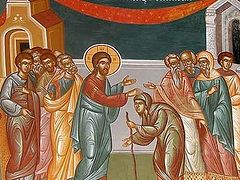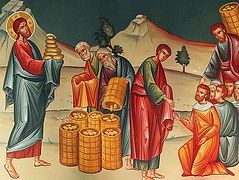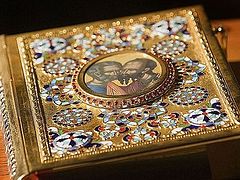And straightway Jesus constrained his disciples to get into a ship, and to go before him unto the other side, while he sent the multitudes away. And when he had sent the multitudes away, he went up into a mountain apart to pray: and when the evening was come, he was there alone. But the ship was now in the midst of the sea, tossed with waves: for the wind was contrary. And in the fourth watch of the night Jesus went unto them, walking on the sea. And when the disciples saw him walking on the sea, they were troubled, saying, It is a spirit; and they cried out for fear. But straightway Jesus spake unto them, saying, Be of good cheer; it is I; be not afraid. And Peter answered him and said, Lord, if it be thou, bid me come unto thee on the water. And he said, Come. And when Peter was come down out of the ship, he walked on the water, to go to Jesus. But when he saw the wind boisterous, he was afraid; and beginning to sink, he cried, saying, Lord, save me. And immediately Jesus stretched forth his hand, and caught him, and said unto him, O thou of little faith, wherefore didst thou doubt? And when they were come into the ship, the wind ceased. Then they that were in the ship came and worshipped him, saying, Of a truth thou art the Son of God. And when they were gone over, they came into the land of Gennesaret (Mt. 14:22-34).
After the miraculous multiplication of loaves, the Lord commanded His disciples to get into their boat and go before Him to the other side of the sea, until He let the people go.
Having let the people go, He ascended the mountain to pray alone. He prayed all evening and all night until the fourth watch of the night while they were on the water. They were in the middle of the sea when the tempest started. There may be beautiful weather at the beginning of our journey, when suddenly we are overtaken by a storm. As they say, after a lengthy calm, expect a storm. Such is life. Such is our path in the Church.
The disciples of Christ were where Christ had sent them, and yet they did not escape the storm. There should be nothing unexpected for the disciples of Christ in that they meet with storms on their ministerial path. And there’s nothing strange in that Christ sends them to the open sea, knowing ahead of time what awaits them. The Lord wants to show them a yet more wonderful grace than there was with the five loaves, and to draw them yet deeper into the mystery of His Cross.
It was a great test for Christ’s disciples to find themselves alone, without their Lord, in the midst of the storm. It was not as earlier, when they were in a boat and He was sleeping on the stern (Mk. 4:38). Thus the Lord sends us, raising us gradually from minor difficulties to greater difficulties, that we might learn to live by faith.
Although the wind was oncoming and the boat was thrown about by the waves, having received a command from the Lord to sail to other shore, they did not think about turning back, but rowed with all their strength where the Lord said to go. Let troubles and difficulties increase, the holy Church tells us today—nothing will force us to deviate from our path. We see the love of Christ and His care for His Church. Extreme circumstances experienced by the people of God are the Divine hour of the Lord’s visitation and appearance to His Church.
Christ walks on the water, manifesting His sovereign power over all the elements. We need not ask how He did it. It’s enough to see his Divine power. Christ does that which He wants in order to save us.
We know how weak our faith is sometimes. And the disciples, having seen Him walking on the sea, cried out in fear. “It’s a ghost,” they said, when they should have said, “It’s the Lord,” as the apostle John the Theologian would later say, seeing the risen Christ standing on the shore.
The Lord draws near to us in order to deliver us from troubles, but we do not recognize Him and we fear not only troubles, but also His approach. The greatest danger from all external misfortunes is internal confusion and fear, when we begin to fear everything. It’s a sign that, forgetting about God, we are giving room to the devil in our hearts.
We see how fearlessly the Lord walks on the water as the storm rages. He is calm, He is in God’s peace, in faith—that is, in trust of the Heavenly Father’s love. It’s His path to the Cross; He goes to meet the danger that threatens us. He goes to make war with death, to give us life and deliver us from all fear.
And Peter went to be with the Lord, on the water. But seeing the strong wind, he was afraid and began to sink, and shouted, “Lord, save me!” Peter submerged himself in death out of fear, and fear came to him from doubts in faith. This happens with us all, when we are threatened with some danger. But as soon as we call upon Him, the Lord immediately extends to us a saving hand, calming the storm, and taming the forces of death. He reveals to us the miracle of the Resurrection, and again and again teaches us faith and trust in God’s providence and victory over fear and despair.
How many times we have begun to drown in the sea of this life, but some invisible hand supported us and suddenly led us out of danger, and again, we heard these words: O thou of little faith, wherefore didst thou doubt? (Mt. 14:31). Let us remember the former blessings of God, and in the future, in any danger call upon the name of God, and we will be saved.
The Lord hesitated to help for some time in order to test our faith, but now He hurries to save us from the greatest danger, that we might know Him better and learn His love from Him. Only in love is there no fear, and perfect love casts out all fear (1 Jn. 4:18). He is able to calm any storm with but a word.
“It is I,” He says, “Be not afraid!” He does not call Himself by name; for Him it is enough to say, “It is I,” because they know His voice, being His sheep. Only He can give such peace and quiet. “It is I,” and therefore, “be not afraid.” Fear Me not, now that you know it is I. Christ cannot be fearful for those to whom He reveals Himself. The whole fear of eternal torment is the loss of communion with Christ. The world is languishing today from fear of the calamities that are coming upon the universe. But if people would come to know Christ, all fear would immediately disappear. “It is I, and be not afraid of the storms, winds, and waves raging in human history and in our personal lives. Fear them not while I am yet with you. I am He Who continually cares for you and Who will never stand and watch as you perish.” Nothing—neither storms nor death itself should be fearful for us who have Christ with us.
Let us walk to Christ on the waters of the sea of life, and Christ will not let us sink; the world will not be able to devour us. We will walk on water, as already participating in His Resurrection, and there will be no danger in this water, supporter by the power of those same hands that He stretched out on the Cross. No one can walk towards Christ if he is not strengthened by His power. And as long as our gaze, like Peter’s, is fixed upon Christ, upon His word, and upon His power, we will walk above the abyss. But as soon as we lose sight of Christ for even a moment and see only the waves sweeping over us and the wind—only that which is happening in the world today—we will understand that it’s impossible to walk on water, fear will seize us, and we will begin to drown.
But even here, as soon as we call on Him for help from the depth of despair, we come to understand why Christ is called our Savior. He comes to save us, when everything is already helpless. And He is with all those who believe in Him—especially when they are drowning—at the distance of His outstretched hand. He does not reject us of little faith but allows us to endure the storms that we might grow in faith, learning to walk with Him. And the saved, together with the apostle and the entire Church, bring him a personal confession of gratitude and love and worship Him: Truly this was the Son of God (Mt. 27:54).





